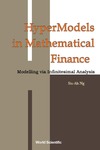At the beginning of the new millennium, two unstoppable processes are taking place in the world: (1) globalization of the economy; (2) information revolution. As a consequence, there is greater participation of the world population in capital market investment, such as bonds and stocks and their derivatives. Hence there is a need for risk management and analytic theory explaining the market. This leads to quantitative tools based on mathematical methods, i.e. the theory of mathematical finance.
Ever since the pioneer work of Black, Scholes and Merton in the 70's, there has been rapid growth in the study of mathematical finance, involving ever more sophisticated mathematics. However, from the practitioner's point of view, it is desirable to have simpler and more useful mathematical tools.
This book introduces research students and practitioners to the intuitive but rigorous hypermodel techniques in finance. It is based on Robinson's infinitesimal analysis, which is easily grasped by anyone with as little background as first-year calculus. It covers topics such as pricing derivative securities (including the Black-Scholes formula), hedging, term structure models of interest rates, consumption and equilibrium. The reader is introduced to mathematical tools needed for the aforementioned topics. Mathematical proofs and details are given in an appendix. Some programs in MATHEMATICA are also included.
 |
|
О проекте
|
|
О проекте


